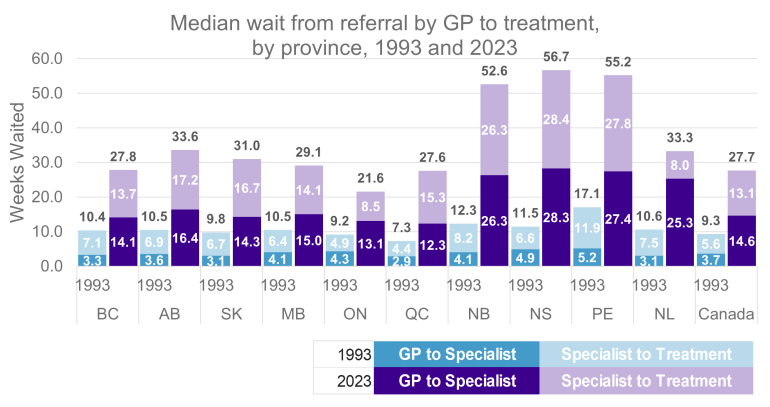Question:
How have wait times for medical procedures in Canada changed over the past 30 years? And will it affect overall population level mortality?
Answer:
Wait times for medical procedures in Canada have almost tripled in the past 30 years and have increased by 1/3rd since the beginning of the pandemic. And, not surprisingly, increased wait times are associated with increases in all-cause mortality.
Canada’s health care system has received a fair amount of negative press in recent years, with increased wait times receiving much of the attention. The focus on wait times is understandable, a survey of 2,000 Canadians commissioned by Health Canada revealed wait times were chosen as the item Canadians’ viewed as most indicative of the overall state of the Canadian health system1
Despite the public’s interest in wait times, the provincial health authorities in Canada do not publish comprehensive statistics on wait times. To fill this gap, the Fraser Institute performs an annual survey of medical practitioners across twelve medical specialties2 in order to estimate wait times across Canada. The results, shown in the chart below, do not paint a pretty picture. Overall wait times in Canada have almost tripled in the past 30 years. It shouldn’t be a surprise that a recent survey by Leger found 70% of Canadians were worried about not being able to get good quality medical attention3.

Sources: Waiting Your Turn, Wait Times for Health Care in Canada, 2023 Report Fraser Institute
Key takeaways
- Wait times for medical procedures in Canada have almost tripled in the past 30 years and have increased by 1/3rd since the beginning of the pandemic.
- Increased wait times likely lead to higher overall levels of mortality. A 2014 study by the Fraser Institute estimated that wait times may have been responsible for 2.5% of female deaths over the period 1993 to 2009.
- SecondStreet.org estimates that approximately 31,000 Canadians died while waiting for medical procedures over the period from April 1, 2022 to March 31, 2023.1
What impact do wait times have on overall mortality?
Assessing the impact of wait times on mortality can be challenging. A study performed using data from US Veteran Affairs found that for individuals longer wait times were actually associated with lower short term mortality4. However, this seemingly counter-intuitive result is likely due to the “triage” effect, whereby patients with more severe conditions who are often already critical, receive care soonest.
Perhaps more relevant is the 2014 study by the Fraser Institute, “The Effect of Wait Times on Mortality in Canada” which used population level statistics to estimate the impact of wait times on all-cause mortality5. This study showed that wait times were in fact linked to higher all-cause mortality, although this finding was only statistically significant for females. This study estimated that each additional week of wait time increased all-cause female mortality by 3 deaths per 100,000 individuals. While on the surface this might not sound like a large impact, the study estimated that from 1993 through 2009, wait times led to over 44,000 additional females deaths – accounting for approximately 2.5% of all female deaths for this period.
When one considers that overall wait times in Canada have increased by 71% since 2009 (and 33% since 2019), it is safe to assume that wait times are having an ever-increasing impact on overall mortality in Canada and could be a significant factor in the continued levels of non-COVID excess deaths observed since the pandemic.
The key questions are:
- Will the Federal and Provincial governments be able to enact policies to reduce wait times?
- What impact will wait times have on the future of Canadian mortality?
- What proportion of non-COVID excess deaths are the result of increased wait times?
What do you think?
1 https://publications.gc.ca/collections/collection_2007/hcc-ccs/H174-11-2007E.pdf (page 52)
2 https://www.fraserinstitute.or...
3 https://leger360.com/surveys/h...
4 Prentice JC, Pizer SD. Delayed access to health care and mortality. Health Serv Res. 2007 Apr;42(2):644-62. doi: 10.1111/j.1475-6773.2006.00626.x. PMID: 17362211; PMCID: PMC1955366.




